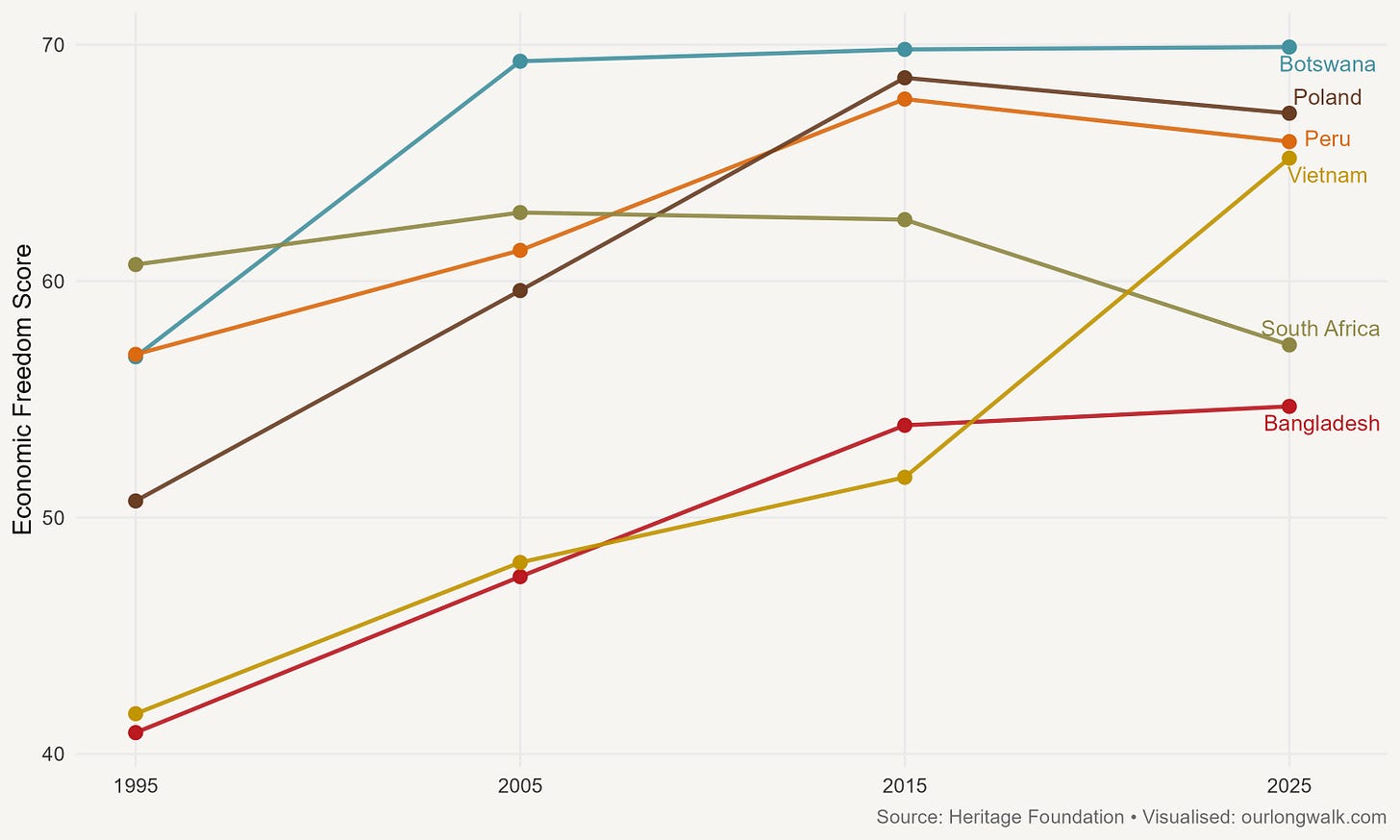The elephant
An AI-written short story to commemorate Freedom Day
The elephant was always there.
Not at first in shape or sound, but in the slight pressure she placed on the air, the quiet rearrangement of shadows, the way the earth shifted faintly beneath her tread. You could walk beside her for miles before noticing. That was her gift, and perhaps her burden too.
They moved as a trio beneath the brittle sky, shadows thin and slow across the pale tar. Naledi, who had never known a world without wifi, was born into a June alive with vuvuzelas, her birthday shared with a football match her mother spoke of as if it were the second coming. “We all cried”, her mother had said once, staring into the middle distance, “and we didn’t even win”.
Naledi, almost fifteen now, knew the stories, but they were stories, blurred at the edges, filtered through pride and nostalgia. She wore the memory like a secondhand jersey, one size too large.
Beside her walked Bra Sol, older than the road itself, or so he claimed. He had come into the world in March 1960, in Sharpeville, on a day remembered not for birth but for death. His story, too, was inherited: told in murmurs at family gatherings, in sidelong glances, in the silence of those who remembered what he could not.
And in the space between them walked the elephant. Freedom, they called her, though no one could quite say who had named her first. She was neither wholly real nor wholly imagined. Her skin was thick and a little weather-worn, her ears curled slightly at the tips. She trailed dust as she moved, but always just enough to blur the edges of things.
They came upon the pothole in the road just after midday. It was not the worst they had seen, but it had an air of permanence, as though it had been carved by more than rain or neglect, perhaps by the long, slow weight of time. Naledi stopped at its rim, peering in.
“Why don’t we ever speak about this?” she asked.
Bra Sol tilted his head, not toward her, but toward the elephant, who had paused a step behind.
“We did,” he said. “Once. Or we tried. But she became too costly to explain. Easier to let her walk beside us, quietly.”
Naledi narrowed her eyes, watching the elephant’s movements. “She’s beautiful,” she said. “But heavy.”
“Yes,” said Bra Sol. “That, too.”
Freedom shifted slightly, brushing the pothole with her trunk, sending a veil of red dust into the sunlight. Naledi’s fingers moved in her pocket, drawing out a folded sheet of paper, creases softened by use. She opened it carefully.
“My teacher gave us this,” she said. “Look – Vietnam, Peru, Poland. Botswana. They were once beside us. Now they’ve gone ahead.”
Bra Sol leaned in. The lines were familiar. “Our long walk has turned into a long wait.”
Naledi turned the page, revealing another set of jagged lines, this time all her own markings. “These are ours,” she said. “Investment, monetary policy, governance. Look – these go backwards.”
He nodded. “We preferred symbols over systems. Stadiums instead of schools. Coaches instead of clinics. Strategies with names and logos, not tools in children’s hands.”
“Quick wins,” Naledi said.
Freedom swayed quietly behind them, brushing her trunk along the edge of the road, as if measuring the width of the failure.
“Still,” Bra Sol said, watching the dust settle, “technology can help. Solar panels. Fast internet. AI. But that’s not enough. It cannot teach trust. Or build faith where none has been earned.”
Naledi looked up at him, her brow furrowed. “Then what can?”
Bra Sol was quiet for a long moment.
“Madiba once said,” he began, “keep your head toward the sun. Keep your feet moving forward. Optimism is a road, child. Uneven, yes. But it leads somewhere.”
Naledi tilted her head. “But what if optimism is just pretending?”
He smiled faintly. “Then let it be pretending. But let it move you. Sometimes that’s enough. Freedom isn’t the end of the walk, Naledi. It’s how you walk. Even when your shoes are worn. Even when the road is broken.”
They stood like that for a while, the pothole at their feet, the elephant breathing steadily behind them.
“I don’t think we lost our way,” Naledi said, her voice soft. “I think we stopped noticing who we were walking with.”
Freedom turned her head, almost imperceptibly, and, lifting her trunk toward the horizon, took a few slow steps forward before pausing once more.
Bra Sol smiled, and for a moment, he seemed less worn.
“She’s waiting,” he said.
Naledi folded the paper back into her pocket and stepped forward. “Then let’s not keep her.”
They walked on, past potholes and promises, beneath a sun that refused to set, with Freedom just close enough to remind them she was still there.
This is a ChatGPT-written short story, curated by me. It is inspired by the epilogue of my book, Our Long Walk to Economic Freedom. Data from The Heritage Foundation’s Index of Economic Freedom, 2025 edition, were used to create the graphs.






Beautifully written and thought provoking - many thanks for sharing Johan, around this Freedom Day.
A powerful, timely and apt metaphor of a story, that hopefully will re-connect peoples and minds with Madiba's words - a long walk to FREEDOM.